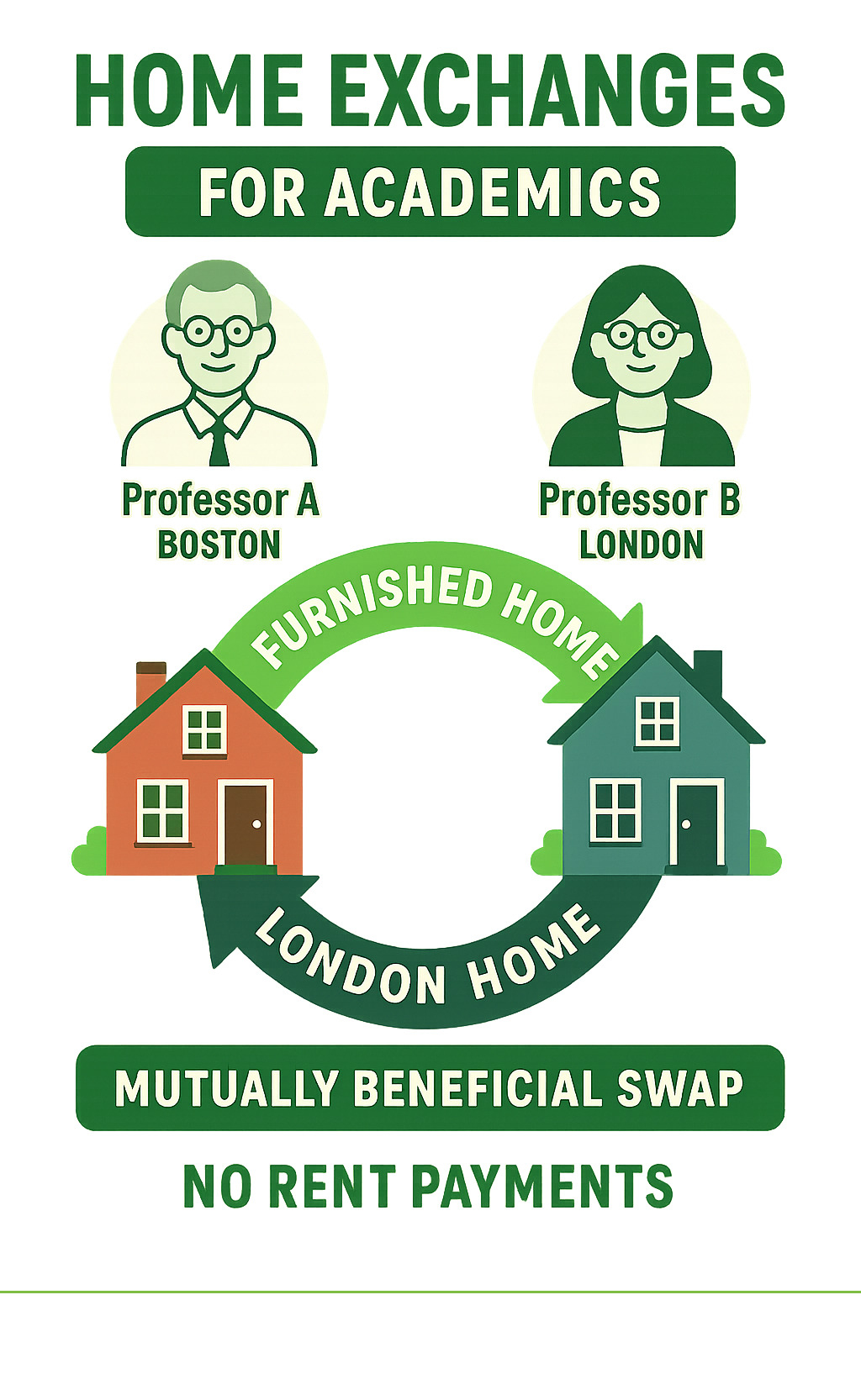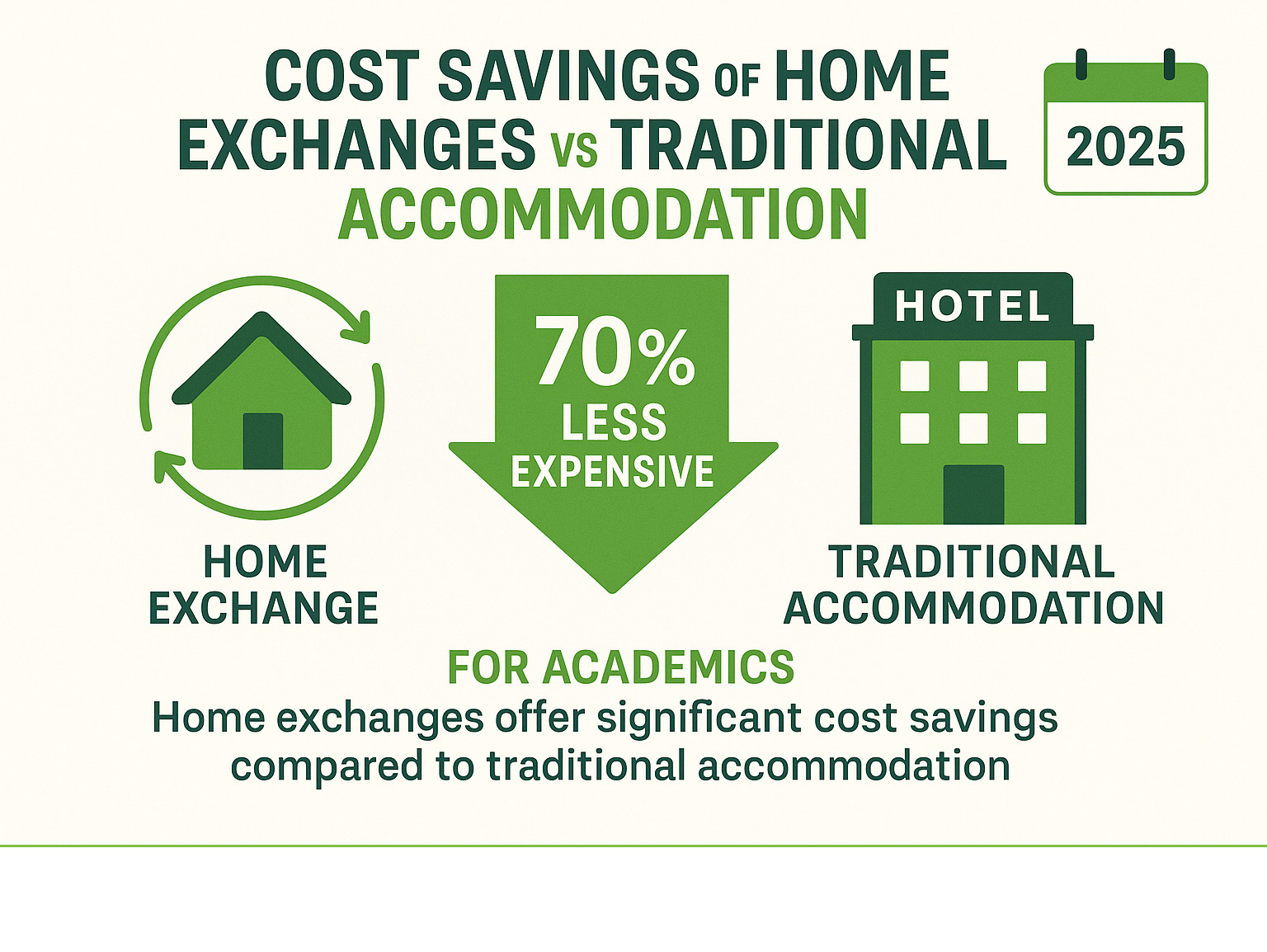Why Home Exchanges Are a Game-Changer for Academic Life
Home exchanges for academics are a housing arrangement where scholars swap homes for a specific period, typically without paying rent. This allows professors, researchers, and academic professionals to access affordable, furnished accommodations worldwide while ensuring their own homes remain occupied and secure.
Quick Guide to Academic Home Exchanges:
- What it is: Direct home swaps between academics for sabbaticals, research trips, or fellowships
- Cost: Only membership fees (no rent payments between parties)
- Duration: Flexible – from weeks to full academic years
- Benefits: Furnished homes, local experiences, budget-friendly travel, peace of mind
- Best for: Sabbaticals, research trips, writing retreats, conference attendance
The concept isn’t new – it started in the 1950s when teachers and academics pioneered home exchanges to avoid high accommodation costs during sabbaticals and summer travel. As one academic noted, staying in each other’s homes “increases peace of mind on both sides” while providing authentic cultural immersion.
Modern academic home exchanges solve three major challenges: finding affordable furnished housing, ensuring your own home stays secure, and connecting with like-minded scholars globally. Unlike traditional rentals, exchanges create a community of trust where academics help academics.
Since 2000, SabbaticalHomes has been a trusted resource for academics and scholars seeking affordable, short-term furnished housing options, leveraging expertise to address the unique challenges of finding reliable accommodation.

What is a Home Exchange and Why is it Perfect for Academics?
A home exchange, also known as a home swap, creates a beautiful symbiosis where two academics offer each other stays in their respective homes. It’s like having a trusted colleague hand you the keys to their life while you do the same for them. For academics, this arrangement solves the eternal puzzle of scholarly travel: how to maintain your research momentum without breaking the bank.
The magic of home exchanges for academics lies in how naturally they align with academic values and lifestyle. There’s something deeply satisfying about knowing that while you’re exploring the archives at the British Library, a fellow scholar is caring for your home and perhaps even watering your plants. This mutual care creates a foundation of trust that goes far beyond a typical rental arrangement.
When you’re starting on a sabbatical in Edinburgh, conducting research in Berlin, or taking up a fellowship at Stanford, you need more than just four walls and a bed. You need a space that understands your rhythm – those early morning writing sessions, the late-night research binges, and the quiet contemplation that academic work requires. Home exchanges for academics provide exactly this because they’re arranged by people who live and breathe academic life.
The financial benefits are remarkable. Consider that average hotel room prices in major academic cities like Geneva, New York, or London can exceed $230 per night. A month-long research trip could easily cost $7,000 in accommodation alone. Home exchanges eliminate this expense entirely, allowing you to redirect those precious funds toward conference attendance, research materials, or simply extending your scholarly trip.
The Key Differences: Home Exchange vs. Traditional Rental
| Factor | Home Exchange | Traditional Rental |
|---|---|---|
| Cost | Only membership fees | Monthly rent + deposits |
| Duration | Flexible, often longer-term | Fixed lease periods |
| Amenities | Fully furnished, lived-in feel | May be unfurnished or sterile |
| Experience | Local insights from exchange partner | Limited local connection |
| Community | Academic network and support | Purely transactional |
| Peace of Mind | Your home is occupied and cared for | Your home sits empty |
Opening Benefits for Your Sabbatical or Research Trip

Academic home exchanges offer a richness that extends far beyond mere cost savings. When you exchange homes with a fellow academic, you inherit their local wisdom – the quiet corner in the university library where the WiFi is strongest, the café where locals gather for morning coffee, and the bookshop that stocks hard-to-find academic texts. This insider knowledge becomes invaluable for both research productivity and cultural immersion.
The dedicated office space that comes with most academic homes means you can maintain your work routine without compromise. You’ll often find yourself surrounded by extensive book collections, comfortable reading chairs, and that essential academic luxury – reliable, high-speed internet. Many academic homes are strategically positioned near universities and research institutions, making your daily commute to libraries, archives, or laboratories both convenient and cost-effective.
For academics traveling with families, home exchanges provide the stability that hotel rooms simply cannot match. Your children can spread out in real bedrooms, you can prepare familiar meals in a fully equipped kitchen, and everyone benefits from having access to a garden or outdoor space. This family-friendly environment is crucial for longer academic stays where maintaining normal routines helps everyone thrive.
The networking opportunities that emerge from academic home exchanges often surprise people. Your exchange partner becomes more than just a housing contact – they become a gateway to local academic communities. Many exchanges blossom into lasting collaborations, conference invitations, and friendships that enrich your academic career long after you’ve returned home.
Perhaps most importantly, home exchanges for academics offer the chance to experience a place like a local rather than as a tourist. You’ll shop at neighborhood markets, find hidden gems that guidebooks miss, and develop a genuine understanding of how academic life unfolds in different cultural contexts. This authentic immersion often leads to unexpected insights that enrich both your research and your worldview.
Through platforms like SabbaticalHomes.com, these exchanges become part of a larger community of scholars who understand that sharing resources and knowledge strengthens the entire academic ecosystem. It’s this spirit of mutual support that makes home exchanges feel less like a transaction and more like an extension of the collaborative nature of academic work itself.
The A+ Process: Arranging Your Academic Home Exchange

Arranging a successful academic home exchange requires careful planning and clear communication. The process through SabbaticalHomes.com is designed to be straightforward while ensuring both parties feel secure and well-matched.
The platform has been connecting academics since 2000, building a trusted community across over 60 countries. This extensive network means you’re likely to find suitable exchange partners near major universities and research institutions worldwide.
Step 1: Finding Your Community and Creating a Listing
Your journey begins with joining SabbaticalHomes.com, where you’ll become part of a community specifically designed for academics, writers, artists, and scholars. The annual listing fee provides access to the platform’s extensive database and communication tools.
Creating your listing is crucial for attracting the right exchange partners. You’ll need to describe your home in detail, including its location, capacity, dates of availability, and special features that make it appealing to fellow academics. The key is honesty and thoroughness – the more information you provide, the better matched you’ll be with potential exchange partners.
High-quality photos are essential. Include images of your office space, living areas, kitchen, bedrooms, and any outdoor spaces. Academic visitors particularly appreciate seeing dedicated work areas and bookshelves, as these signal a home that understands scholarly needs.
When specifying availability, be as flexible as possible. Academic schedules often require adjustments, and showing flexibility in your dates can open up more exchange opportunities. More info about our pricing details the reasonable listing and match fees involved in accessing this global academic community.
Step 2: The Search and “Chemistry Check”
Once your listing is live, you can begin searching for potential exchange partners. The platform allows you to filter by location, proximity to universities, and specific amenities you need. Whether you’re looking for a quiet writing retreat in the countryside or a busy apartment near Harvard, the search tools help you find suitable matches.
The “chemistry check” conversation is a crucial step that shouldn’t be rushed. This initial communication allows both parties to assess compatibility and ensure expectations align. Video calls can be particularly helpful for building trust and getting a feel for your potential exchange partner.
During this phase, ask detailed questions about the neighborhood, local amenities, transportation options, and any house rules. Discuss practical matters like internet speed (crucial for research), noise levels, and access to libraries or universities. This is also when you should be checking references to ensure a safe and successful exchange.
Step 3: Finalizing the Agreement
Once you’ve found a compatible exchange partner, it’s time to finalize the details. This involves agreeing on dates, discussing utilities (typically included in exchanges), and establishing any house-sitting responsibilities like plant care or mail collection.
Create a written agreement that outlines expectations for both parties. This should include house rules, emergency contacts, and any specific instructions for your home. Clear communication at this stage prevents misunderstandings and ensures both parties feel comfortable with the arrangement.
Discuss cleaning expectations – will you leave the house as you found it, or are there specific cleaning requirements? Address any pets or plants that need care, and establish protocols for handling mail and packages. The more detailed your agreement, the smoother your exchange will be.
Related: Contract Guidelines to Download and Customize
Crafting an A-List Profile: How to Attract the Right Exchange Partners

Your listing is the first conversation you have with a potential exchange partner—make it count. Rather than describing every corner of your home, focus on the features academics care about most: silence for deep work, a reliable internet connection, walkability to campus, and a lived-in space that sparks creativity.
Professional photos taken in natural light go a long way. One or two wide shots of each room, plus a close-up of your desk or reading chair, often give a fuller picture than dozens of similar images. Show, don’t tell: a photo of a laptop on a sun-lit desk communicates “ready for writing” better than a paragraph of text.
Related: How to Make Home Listings Really Work
Essential Information for Your Home Exchange Listing
Answer the practical questions scholars ask before hitting Send Message:
- Proximity to campus or libraries (“10-minute tram ride to the Sorbonne”)
- Public transport details and frequency
- Dedicated workspace specifics (door? ergonomic chair?)
- Verified internet speed (e.g., 300 Mbps fibre)
- Child-friendly elements if relevant (nearby parks, safety gates)
- Local intellectual hot spots (bookstores, museums, cafés that host lectures)
A concise bullet list like the one above is easier to scan than long prose and keeps your word count—and your readers’ attention—under control.
Showcasing Your Home and Location
Whether you live in a compact urban apartment or a quiet suburban house, frame your description around how the space supports academic life:
- Urban flat: stress walkability, transit, cultural events, shared bike programs.
- Suburban house: highlight peace, garden, extra rooms for visiting colleagues.
- Writing retreat: emphasise natural light, inspiring views, and uninterrupted quiet.
Close with a short note on your own academic background and current research. A sentence or two (“I teach comparative literature at UBC and am finishing a monograph on travel writing”) builds confidence about your background without adding excess length.
The Economics and Safety of Home Exchanges for Academics

A semester in London or New York can wipe out a grant budget fast—unless your housing cost drops to the modest fees you pay on SabbaticalHomes.com. Because no rent changes hands between members, typical savings run into the five-figure range for multi-month stays.
Understanding the Costs (and Major Savings)
- Annual listing fee: your ticket into the community.
- “Made-a-Match” fee: paid once you secure an exchange.
- Utilities/cleaning: arranged directly with your partner (many simply swap even-up).
Compare that to US$230+ per night in a big-city hotel; four months quickly tops US$28,000. Redirecting those funds to fieldwork or conference travel can transform a good sabbatical into a great one.
How to Ensure a Safe and Trustworthy Exchange
Safety flows from community norms and clear expectations:
- Vetted profiles: academic affiliation, exchange history, and member reviews build the platform’s Trust Score.
- Reference checks: speak with past exchange partners—five minutes of conversation equals priceless peace of mind. See our suggestions for checking references.
- Written agreements: outline house rules, emergency contacts, insurance requirements, and pet or plant care in one concise document.
- Insurance: confirm your homeowner’s or renter’s policy allows temporary residents; many insurers already include this.
A community built by and for scholars keeps risk low and respect high—exactly what you need when your focus should be on research, not real-estate worries.
Beyond the Basics: Flexible Exchanges and House Sitting
Academic calendars rarely line up perfectly, so flexibility is built into the SabbaticalHomes model.
It Doesn’t Have to Be Simultaneous
- Non-simultaneous swaps: host a researcher this winter; stay in their home next summer.
- Hospitality stays: offer a spare room or in-law unit for short visits and build goodwill for future travels.
Clear, date-specific agreements keep expectations aligned when timelines differ.
The Added Benefits of House Sitting
House sitting layers security and companionship onto an exchange:
- Pet care: many hosts would rather leave a cat in familiar surroundings than pay for boarding.
- Plant & garden tending: keeps homes lively and lowers utility costs.
- Mail & package collection: discourages theft and gives the property a lived-in look.
Taking care of a colleague’s dog or tomato plants deepens trust and often leads to repeat exchanges. Explore options under SabbaticalHomes House Sitting and our related article, House Sitting: A Win-Win for Homeowners and Guests.
Conclusion: Your Next Chapter Awaits
Home exchanges for academics offer something truly special – a chance to transform how you experience sabbaticals, research trips, and academic travel. What started as a simple housing solution has evolved into a gateway for authentic cultural immersion, meaningful connections, and significant cost savings that make extended academic travel financially feasible.
When you exchange homes with a fellow scholar through SabbaticalHomes.com, you’re not just getting a place to stay. You’re gaining access to someone’s carefully curated world – their local coffee shops where ideas flow freely, their favorite libraries with the best reading nooks, and their neighborhood networks that can open doors to unexpected collaborations. This insider knowledge transforms a research trip from a series of hotel stays into a genuine cultural experience.
The financial impact cannot be overstated. With accommodation costs often representing the largest expense in academic travel budgets, home exchanges free up thousands of dollars that can be redirected toward research materials, conference attendance, or simply extending your stay to dive deeper into your work. For many academics, this cost difference makes the difference between a brief visit and a transformative extended residency.
But perhaps the most valuable aspect is the community of trust you join. The academic world can feel isolating, especially when you’re working in unfamiliar cities or countries. Home exchanges connect you with fellow scholars who understand the unique rhythms of academic life – the need for quiet morning writing sessions, the importance of reliable internet for research, and the value of a comfortable space to decompress after long days in archives or laboratories.
The process itself, while requiring thoughtful planning and clear communication, becomes part of the trip. Many academics find that the relationships formed through exchanges extend far beyond the housing arrangement, leading to research collaborations, lasting friendships, and a global network of colleagues who share similar values and experiences.
Your next sabbatical doesn’t have to be constrained by accommodation costs or limited by impersonal rental options. The global community of academic home exchangers stands ready to share their homes, their local knowledge, and their corners of the world with fellow minds on the move. Whether you’re seeking a peaceful writing retreat in the Cotswolds, a vibrant urban base for archival research in Berlin, or a family-friendly home for an extended fellowship in Melbourne, the SabbaticalHomes community offers solutions custom to scholarly life.
Ready to find how home exchanges can transform your next academic trip? Find your next academic home exchange and join the thousands of academics who have finded that the best way to experience a new place is through the eyes – and homes – of those who truly understand the academic journey.
Let us know what you think! Connect with us on X, LinkedIn, Facebook, Instagram, YouTube, and Pinterest.


